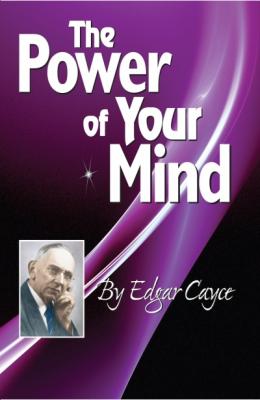The Power of Your Mind. Edgar Cayce
Читать онлайн.| Название | The Power of Your Mind |
|---|---|
| Автор произведения | Edgar Cayce |
| Жанр | Личностный рост |
| Серия | |
| Издательство | Личностный рост |
| Год выпуска | 0 |
| isbn | 9780876046715 |
The Power of
By Edgar Cayce
The Power of
By Edgar Cayce
A.R.E. Press • Virginia Beach • Virginia
Copyright © 2009
by the Edgar Cayce Foundation
2nd Printing, April 2010
Printed in the U.S.A.
All rights reserved. No part of this book may be reproduced or transmitted in any form or by any means, electronic or mechanical, including photocopying, recording, or by any information storage and retrieval system, without permission in writing from the publisher.
A.R.E. Press
215 67th Street
Virginia Beach, VA 23451-2061
ISBN 13: 978-0-87604-589-3 (trade pbk.)
Edgar Cayce Readings © 1971, 1993-2007
by the Edgar Cayce Foundation.
All rights reserved.
Cover design by Richard Boyle
Contents
Foreword: Who Was Edgar Cayce? by Charles Thomas Cayce, Ph.D.
Editor's Explanation of Cayce's Discourses by John Van Auken
Chapter 1 As a Mind Thinks, So It Is!
Chapter 2 Thoughts Are Things!
Chapter 3 Body-Mind Connection
Chapter 5 Too Conscious of Self
Chapter 8 The Mind Is Symbolized in the Son
Foreword
Who Was Edgar Cayce?
It is a time in the earth when people everywhere seek to know more of the mysteries of the mind, the soul,” said my grandfather, Edgar Cayce, from an unconscious trance from which he demonstrated a remarkable gift for clairvoyance.
His words are prophetic even today, as more and more Americans in these unsettled times are turning to psychic explanations for daily events. For example, according to a survey by the National Opinion Research Council, nearly half of American adults believe they have been in contact with someone who has died, a figure twice that of ten years earlier. Two-thirds of all adults say they have had an ESP experience; ten years before, that figure was only one-half.
Every culture throughout history has made note of its own members' gifted powers beyond the five senses. These rare individuals held special interest because they seemed able to provide solutions to life's pressing problems. America in the twenty-first century is no exception.
Edgar Cayce was perhaps the most famous and most carefully documented psychic of our time. He began to use his unusual abilities when he was a young man, and from then on for over forty years he would, usually twice a day, lie on a couch, go into a sleeplike state, and respond to questions. Over fourteen thousand of these discourses, called readings, were carefully transcribed by his secretary and preserved by the Edgar Cayce Foundation in Virginia Beach, Virginia. These psychic readings continue to provide inspiration, insight, and help with healing to tens of thousands of people.
Having only an eighth-grade education, Edgar Cayce lived a plain and simple life by the world's standards. As early as his childhood in Hopkinsville, Kentucky, however, he sensed that he had psychic ability. While alone one day he had a vision of a woman who told him he would have unusual power to help people. He also related experiences of “seeing” dead relatives. Once, while struggling with school lessons, he slept on his spelling book and awakened knowing the entire contents of the book.
As a young man he experimented with hypnosis to treat a recurring throat problem that caused him to lose his speech. He discovered that under hypnosis he could diagnose and describe treatments for the physical ailments of others, often without knowing or seeing the person with the ailment. People began to ask him other sorts of questions, and he found himself able to answer these, as well.
In 1910 the New York Times published a two-page story with pictures about Edgar Cayce's psychic ability as described by a young physician, Wesley Ketchum, to a clinical research society in Boston. From that time on people from all over the country with every conceivable question sought his help.
In addition to his unusual talents, Cayce was a deeply religious man who taught Sunday school all of his adult life and read the entire Bible once for every year that he lived. He always tried to attune himself to God's will by studying the Scriptures and maintaining a rich prayer life, as well as by trying to be of service to those who came seeking help. He used his talents only for helpful purposes. Cayce's simplicity and humility and his commitment to doing good in the world continue to attract people to the story of his life and work and to the far-reaching information he gave.
Charles Thomas Cayce, Ph.D. (Edgar Cayce's grandson)
Association for Research and Enlightenment, Inc.
Editor's Explanation of Cayce's Discourses
Edgar Cayce dictated all of his discourses from a self-induced trance. A stenographer took his discourses down in shorthand and later typed them. Copies were sent to the person or persons who had requested the psychic reading, and one was put into the files of the organization, which built up around Cayce over the years: the Association for Research and Enlightenment, better known as the A.R.E.
In his normal consciousness, Edgar Cayce spoke with a Southern accent but in the same manner as any other American. However, from the trance state, he spoke in the manner of the King James Bible, using “thees” and “thous.” In trance, his syntax was also unusual. He put phrases, clauses, and sentences together in a manner that slows down any reader and requires careful attention to what's being said. This caused his stenographer to adopt some unusual punctuation in order to put into sentence form some of the long, complex thoughts conveyed by Cayce while in trance. Also, many of his discourses are so jam-packed with information and insights, and with
